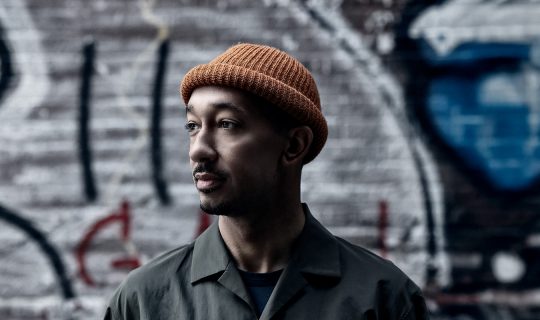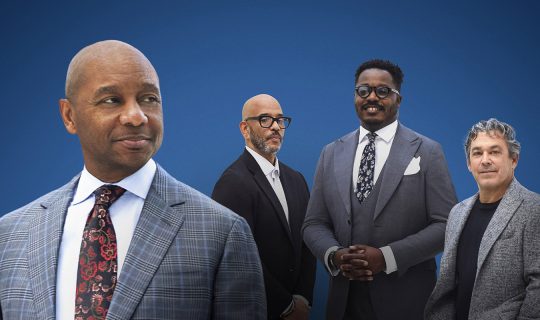December 2, 2012
Nineteen sixty-two saw St. Louis-born soul-jazz guitar hero Grant Green exploring not only the full range of his instrument, as usual, but the full range of his imagination. Over the course of six sessions as a leader for Blue Note that year, Green tried his hand at spirituals, Latin music, cowboy songs, and, of course, standards, not to mention the odd original tune. Notably, on these dates, the six-stringer also distanced himself from the organ sound he had cultivated the year before with Jack McDuff and Baby Face Willette; his partners in harmony during this time were the pianists Johnny Acea, Sonny Clark, and a twenty-two-year-old Herbie Hancock, whose debut album, Takin’ Off, was also a product of the 1962 Blue Note machine. (Green returned the favor on Hancock’s sophomore voyage, 1963’s My Point of View, also on Blue Note.)
Green’s first two 1962 trips to Rudy Van Gelder’s Englewood Cliffs, NJ studio, on January 13 and 31, resulted in the LPs Nigeria and Oleo, currently collected on the two-CD set The Complete Quartets with Sonny Clark. Also featuring bassist Sam Jones—who made the Nigeria session in the same week he recorded on the Cannonball Adderley classic In New York—and either Louis Hayes or Art Blakey on drums, the magic of the January sessions stems from the synergy between Clark and Green, two down-home players who had found each other in the Big City. The Gershwins’ “It Ain’t Necessarily So,” from Nigeria, is as greasy as it gets, Green’s burning blues licks wiggling and trilling in anticipation of Clark’s deep, behind-the-beat, sleazy-in-a-good-way comping and leads. Sadly, though he would appear on Green’s Born to Be Blue and a few other 1962 sessions, Clark would die of a heroin overdose on January 13, 1963, one year to the day after the recording of Nigeria. Clark, whose music was championed by John Zorn in the ’80s, was thirty-one when he passed.
In April, Green returned to Van Gelder’s spot for The Latin Bit, the first of three concept albums he would record before the end of the year. Brought to life by bassist Wendell Marshall, drummer Willie Bobo, conguero Patato Valdes, Garvin Masseaux on chekere, and Acea on piano, Bit takes a bite out of steamy Latin numbers like “Mambo Inn,” “Besame Mucho,” “Tico Tico,” and Bird’s “My Little Suede Shoes.” After a fairly faithful run-through on the form of “Mucho,” Green and company transform Consuelo Velazquez’s dramatic prelude to a kiss into a slow, sultry swing piece pierced by the leader’s seductive, leisurely runs and the steady push of the Bobo/Valdes/Masseaux percussion trio.
Green’s next journey to Jersey, in November, resulted in Goin’ West, a five-song trek into the country for which he was accompanied by Hancock and two recently freed agents: bassist Reggie Workman, fresh from a fruitful stint with John Coltrane, and drummer Billy Higgins, no longer with Ornette Coleman due to cabaret card issues. Alongside takes on lived-in, happily weary compositions like “On Top of Old Smokey” and “Tumbling Tumbleweeds”—yes, the same tune that plays over the opening credits of The Big Lebowski—the quartet dusts off Don Gibson’s “I Can’t Stop Loving You,” a song Ray Charles had taken to the top of the charts earlier that year. Prefaced by a dead-on honky-tonk pickup from Hancock, the song begins with restrained guitar and supportive piano duetting for a sublime few seconds until Workman’s booming half-notes and Higgins’s subtly funky brushwork emerge to help the listener get back in the saddle. Clocking in at under three-and-a-half minutes and featuring very little soloing, “Loving You” also makes a case for the idea that not every jazz song need be a marathon blowout.
Feelin’ the Spirit, Green’s final ’62 session as a boss or otherwise, was realized in December with ample aid from Hancock, Higgins, Masseaux, and bassist Butch Warren, soon to join Thelonious Monk’s quartet. A collection of uncredited spirituals save for Harry Burleigh’s “Deep River,” Spirit manages to extract joyful noises from tunes like “Joshua Fit de Battle of Jericho” and “Sometimes I Feel Like a Motherless Child” while still maintaining an appropriate air of somberness. “Deep River,” though, is particularly devastating, due in no small part to its intro. Over gorgeously sad piano, Warren’s heartbreaking arco tones, and quiet cymbal taps from Higgins, Green states the lean melody with majesty and grace, revealing a sensitive side that fans of his wilder ’70s albums might not be aware of.
Of course, when not gigging as a leader or heading up recording sessions, Green was busy as a sideman, appearing on four additional Blue Note releases in ’62. Two of the LPs—Preach, Brother! and Elder Don—were under the leadership of Louisiana-born tenor man Don Wilkerson, who filled out the Brother date with Higgins, Warren, and Clark. Green also made it onto female vocalist Dodo Greene’s My Hour of Need and alto authority Lou Donaldson’s The Natural Soul, the latter of which is as juicy a slice of R&B-influenced jazz as there ever was. Green and Donaldson had a special bond—the saxophonist was the one who invited Green to New York in the first place, to audition for Blue Note—and it shows on Natural Soul tracks like the album-opening “Funky Mama,” a backwoods blues where Donaldson lets the rhythm section set things up. On top of Ben Dixon’s loose swing beat and John Patton’s brick wall of organ, Green drops a mind-bendingly simple riff that screams country and aches with depth and wisdom. Like Sweet Lou, Green was all natural and all soul. They don’t make ’em like that anymore.
Photos courtesy of Mosaic Images




